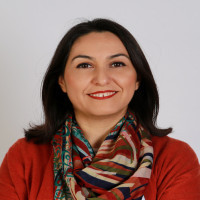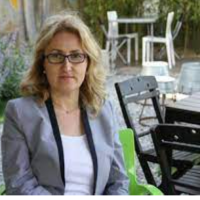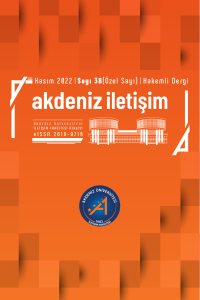Research Article
Issue Editorial Board





After graduating from Istanbul University, Faculty of Arts and Sciences, English Translation and Interpreting (Major) and from the Faculty of Communication, Radio, TV and Cinema (Double Major) programs in 2012, Aydoğan was appointed as a research assistant to the Advertising Department of the Public Relations and Promotion Department of the Faculty of Communication at Akdeniz University within the scope of the Faculty Member Training Program (ÖYP) in 2013. In 2016, she defended her thesis titled "Reflection of Globalization on Advertisements and Advertising Strategies in the Context of Globalization" and graduated from the Public Relations and Promotion Department of the Institute of Social Sciences at Akdeniz University. With the opening of the Advertising Department of the Faculty of Communication at Akdeniz University in 2018, she was appointed to the Advertising Department as a research assistant. In 2021, she graduated from Akdeniz University, Institute of Social Sciences, Department of Public Relations and Publicity by successfully defending her doctoral thesis titled "A Model Proposal for Adult Digital Advertising Literacy" and received her doctorate on 23.12.2021. She was appointed as an assistant professor to the Department of Advertising on 01.02.2023 and still serves as an assistant professor. She received the title of associate professor in Advertising from the Interuniversity General Assembly on 22.03.2024. She continues her research in the fields of digital advertising, brand management, marketing communications, research methods and artificial intelligence.

Aim & Scope
The Journal of Akdeniz University's Faculty of Communication is an academic, peer-reviewed and international journal in which studies in the field of communication are
published. Our journal has been published by Akdeniz University Faculty of Communication since 2003 as a periodical that attaches importance to the interdisciplinary nature of the field of communication and adopts contributing to the development of the literature in the field of communication as a priority task. Journal of Akdeniz University Faculty of Communication is
scanned by ULAKBİM SBVT, EBSCO, RESEARCHBİB, SciLit, SOBIAD, Turkish Education Index, ERIH PLUS and MIAR databases. The language of our journal, which is published as an e-journal twice a year, in June and December, is Turkish and English. The application process of our journal to the Emerging Sources Citation Index (ESCI) continues. Original research and review articles are included in our journal. No royalties are paid to these published works, and the author(s) as the owner of the work approves the full text of their work to be included in non-commercial electronic databases in order to support national and international academic information sharing. A publication and evaluation fee is not required for any work submitted for evaluation in our journal. For this reason, we do not have a fee waiver policy and authors are not paid any fees. The evaluation process is carried out with a double-blind referee system. No concessions are made to the rules of subscribed indexes and published spelling rules. A Turnitin / iThenticate plagiarism report is requested for all submitted work. Authors are responsible for all legal aspects of the content they have prepared. Author candidates submitting articles to the journal; They are deemed to have accepted that they comply with the universal academic ethical principles, include people with intellectual property rights in the study or get written permission, and submit the necessary information about their work to the editorial board.
Our journal is an open access journal and users can access the articles published on the internet free of charge.
Users may download, read, copy, distribute, print, search or link to other full-text articles without any permission and for any legal reason. Unless the users request otherwise, the links
of the published articles can also be shared on the journal's corporate social media accounts.
Author Guidelines
A large number of applications are made to the article calls of our journal. The decisions of the editorial board of our journal are meticulously implemented in order not to violate the rules of the indexes that we are subject to and inspected, and to publish only qualified studies, and studies that violate these rules at a major level are rejected at the preliminary evaluation stage. In case of minor deficiencies, especially in the Author Guidelines, the authors are specifically asked to comply with the corrections and no concessions are made. For this reason, we kindly request that scientists who are considering sending a study to our journal consider the rules and recommendations in this section.
Please read the explanations in the announcements section carefully. No exceptions can be applied to the decisions taken by the Editorial Board.
As per our Editorial Board Decision, since our 35th issue, articles derived from theses, papers, etc., cannot be included due to the large number of articles that we can publish.
If your study is non-original, does not add innovation to the field, in which existing studies (theses, articles, books, etc.) are compiled and reviewed, it is a repetition of the studies that have been done frequently before, it does not contain new findings, does not provide data, does not contain different approaches, etc., it will be rejected at the preliminary evaluation stage. We would like to let you know.
If your article has been published in our journal within the last year, it will not be possible to publish your article due to the index rules we are subject to.
If another scientist (project partner, thesis advisor, assistant researcher, student of the course, etc.) has contributed to your study, this must be stated. If this is not notified, it will not be processed even if the authors request any correction from our journal later. Our journal has no legal responsibility in this sense. Authors who submit articles to our journal are deemed to have accepted the legal issues.
1. Authors should prepare their works on the article template prepared by our Editorial Board. You can download the Akdeniz Communication Manuscript Template here.
2. 2- Authors should upload the following files separately from the article file prepared on the template sent for publication;
a) Similarity Report (Check out article 25)
b) Cover File (a template with author(s) names, orcid number, e-mail, telephone and brief CV)
c) Copyright Transfer Form
d) Ethics Committee Approval Certificate (When Legally Required)
Cover file and copyright transfer form; located on the article submission platform. Documents must be downloaded from the system, filled in, signed and uploaded to the system. Similarity Report and (if necessary) Ethics Committee Permission Certificate should also be uploaded.
3. No author information should be included in the manuscript files sent for evaluation.
4. The text of the article must be prepared using the Microsoft Word word processor program (.doc, .docx). Other formats will not be accepted
5. If the studies have been previously announced in a meeting/symposium, the name, date and place of the meeting must be stated in the footnote (these studies will not be accepted in the 36th issue).
6. If the study has been presented as a thesis, project report, etc., the title of the thesis, institute / institution, advisor, etc. should be reported to the editorial board (these studies will not be accepted in the 36th issue).
7. If the study is supported by a funding institution, information about the funding institution, project number, etc. must be reported to the editorial board.
8. Studies should be between 5000-8500 words, including abstract, tables and footnotes (except Reference and Extended Abstract). Considering that the number of words will increase with the suggestions of the referees, the number of words in the first version sent to the journal should be close to the lower limit.
9. Studies should include English and Turkish abstracts and appropriate Turkish and English keywords. Keywords should be at least 3.
10. Study abstracts (in Turkish and English each) should be between 150 - 250 words.
11. Abstracts should include information about the purpose, method, findings and conclusion of the study. In the title, it should be stated as "abstract". References should not be used in the abstract.
12. APA 7 citation style (https://apastyle.apa.org/style-grammar-guidelines) should be taken into account when making in-text references to the sources used in the articles and preparing the bibliography at the end of the article. The works in the bibliography should be listed alphabetically. The works in the bibliography should be included in the text, and the works cited in the text should be included in the bibliography.
13. At the end of the studies written in Turkish, there should be an English extended abstract of at least 600 and maximum 850 words that briefly summarizes the study. Extended abstract in English is only required for Turkish articles. Extended abstracts are not required for articles in English. Please consider the article template.
14. The main titles of the study (including the titles of Introduction, Conclusion, Bibliography and Extended Abstract) should be written in lowercase, 12 point, bold and centered, with the first letters capitalized. Except for the main title, introduction, conclusion, bibliography and extended abstract sections, all titles should be numbered and these numbered titles should be left-justified in the text. Headings and subheadings should be short and clear. Please consider the article template.
15. Manuscripts should be written in Times New Roman, 12 points and 1.5 line spacing. Manuscripts must be written with the Word program and a Word file (.doc or .docx) must be uploaded to the system, otherwise they will not be evaluated.
16. Page structure right, left, top and bottom 2.5 cm. should be spaced.
17. Paragraphs in the manuscript should be without indent. The paragraph spacing should be 0 pt first, then 6 pt.
18. Manuscripts should not include page numbers.
19. Titles of figures, graphics and pictures should be placed in 10 font size at the bottom, and table titles in 10 font at the top left justified and numbered bold.
20. It will be appropriate to follow the following order in the studies: Title, Abstract, Keywords, Title in Foreign Language, Abstract, Keywords, Introduction, Main Text, Method, Results, Discussion, Conclusion and Bibliography, Extended Abstract in English (if the study is in Turkish).
21. In the studies, citation format should be used in the form of in-text reference instead of footnotes. If footnotes are needed, footnotes should be written in 8 pt and single line spacing.
22. All articles prepared in Turkish or English must have language control.
23. The studies submitted to our journal must be original studies that have not been published elsewhere and have not been sent for publication.
24. Since it is taken into account in the index evaluation process, authors whose work is published in our journal within one year cannot submit a study to our journal with the request of being published in another issue within the same year. In addition, each author is required to submit only one (1) work in one issue for consideration. An author (regardless of whether it is the first, second, third, etc.) should submit only one (1) work per issue. Otherwise, all works by an author will be rejected at the preliminary evaluation stage.
25. All legal, academic, ethical, etc. responsibility belongs to the author(s). Studies should not contain plagiarism, plagiarism report from iThenticate program should be uploaded to the system together with the study. In order for the studies to be evaluated, the iThenticate plagiarism report must be 15% or less (excluding references, matches less than 9 words, citations included). The rate of benefiting from the same study should be at most 3%. Studies with a similarity rate above these rates or without a iThenticate report will be rejected during the preliminary evaluation process.
26. In accordance with the copyright law, the permissions for quotations, tables, pictures, examples, etc. used in the work must be obtained by the authors.
27. If the human factor is involved in research article type studies, then the Ethics Committee Document should be added to the system. Studies that do not require Ethics Committee approval are required to upload to the system a wet-signed petition stating that the manuscript does not include the type of research which requires approval from the Ethics Committee / Institutional Review Board.
All author candidates who submit a work to our journal are deemed to have accepted that they have prepared their work in accordance with the rules here. Studies that do not comply with these rules will be rejected by the editorial board at the preliminary evaluation stage without entering the referee evaluation process.
Ethical Principles and Publication Policy
ETHICAL PRINCIPLES AND PUBLICATION POLICY OF THE JOURNAL OF AKDENIZ UNIVERSITY'S FACULTY OF COMMUNICATION
The publication process of the Journal of Akdeniz University's Faculty of Communication (henceforth, “The Journal of Akdeniz İletişim”) is predicated on the objective production, development and sharing of knowledge through scientific method. The Journal promises to adhere to academic principles and prevent false practices in conformity with academic and ethical standards. In order to maintain the ethical standards for submitted articles, the international standards of the COPE (Committee on Publication Ethics) are taken into account.
The submitting of an article for publication in the Journal through DergiPark article is accepted as an application for publication.
The Journal has the right to edit, publish or not publish the submitted articles.
THE RESPONSIBILITIES OF THE EDITORIAL BOARD
The Editorial Board of the Journal of Akdeniz İletişim (henceforth, “The Editorial Board”) and Editors/Vice Editors are responsible for all the processes before, during and after the publication of each and every article submitted to the Journal of Akdeniz İletişim.
The Editorial Board determines and implements the entire policies of The Journal of Akdeniz İletişim, including but not limited to publication, blind review, assessment process, and ethical principles.
The initiation of blind review process for an article does not indicate a publication promise on behalf of The Journal of Akdeniz İletişim. Likewise, the positive outcome of the review process still necessitates the affirmative decision of The Editorial Board and Editors/Vice Editors for the publication of the article.
The Editorial Board encourages academic honesty. The Editorial Board ensures the originality of the articles by uploading them on Turnitin plagiarism detection software, and evaluating their originality report.
The Editorial Board always examines the claims of plagiarism and abuse in regard to published articles. In case it is established that an author committed plagiarism, or used copyrighted material that belongs to third parties without proper and full reference and permission, The Editorial Board reserves the rights, including but not limited, to retract the article, inform the author’s head of department, dean of faculty and/or other academic institutions.
RESPONSIBILITIES OF EDITORS/VICE-EDITORS
The Editors/Vice-Editors of the Journal of Akdeniz İletişim are responsible for taking measures related to intellectual property rights, unethical and non-academic behaviors and plagiarism during the publication of articles and journals.
Editors/Vice-Editors, when making positive or negative decisions about the articles, take into consideration the originality of the articles, their contribution to the field, the validity and reliability of the research method, the clarity of the narration, and the purpose and scope of the Journal of Akdeniz İletişim.
Editors/Vice-Editors implement the blind peer review and evaluation processes that are among the publication policies of the journal, keep the identities of the referees and authors confidential, and ensure that each article is evaluated objectively and in due time. Editors may correct errors, inconsistencies, or misleading in the articles.
Editors/Vice-Editors ensure the protection of personal data within the journal's publication and ethical principles.
Editors/Vice-Editors pay attention to the protection of human and animal rights in articles, attach importance to documenting the explicit consent of the participants of the research used in article. Editors/Vice-Editors rejects experimental research articles and articles that contains surveys without proper ethics committee approval.
RESPONSIBILITIES OF REFEREES
The opinion of the referees shall be given priority in the decision of the Editorial Board concerning whether the submitted article will be published or not.
The referees should evaluate the work fairly and objectively following the double-blind peer review procedure.
Referees must respect the principle of confidentiality. They are obliged not to use the information obtained from the peer review process for their personal benefit. They should not share their reports or any information in relation to the article.
Referee assessments should be objective and constructive. The academic competence of the article should be taken as a fundamental criterion of assessment. Criticisms on the personalities of the authors are not considered appropriate. Referees should provide explanations and arguments via reports that are provided by the Editors/Vice-Editors. Editors/Vice-Editors do not take into account biased and personalized evaluations or unjustified approvals and refusals, and appoint a new referee for such articles.
The referees should not accept articles that may result in personal or institutional conflicts of interest.
Referees, in case of detection, should notify the journal editorship of any actual or possible plagiarism, multicasting or simultaneous application.
The referees should conduct the evaluation in neutrality and confidentiality. Due to this principle, they should destroy the articles they have reviewed after the evaluation process. Nationality, gender, religious belief, political view and commercial concerns should not disrupt the academic neutrality of the assessment.
Referees should complete evaluations of the articles within due course. In order to improve the academic quality of the article, the referees' suggestions for revisions are delivered to the authors and, if requested by the referees, the corrections made by the authors are sent to the referees.
RESPONSIBILITIES OF AUTHORS
The studies submitted to the Journal of Akdeniz İletişim should not contain plagiarism and should be original. The responsibility lies within the authors in regard to this matter.
Any form of plagiarism is a very serious ethical problem, including self-plagiarisms. Evaluation process will be stopped for the articles that contain plagiarism. If any plagiarism is detected after the publication, Editors/Vice-Editors will take necessary measures.
The author reserves the right to withdraw his/her article provided that the author notifies the withdrawal to the editorial board until the publication decision is taken.
Authors should not use discriminatory language based on gender, race, language, belief, culture, class, age, opinion, rank and sexual orientation.
The works/articles should not violate the privacy and intellectual property rights of a third party.
Authors are obliged to specify all individuals who have a share in their article. Individuals with significant contributions in their article should be cited as co-authors. An article cannot be published without the consent of all authors.
The name of the persons who do not contribute to the article should not be written as an author. Changing the order of authors’ names, removing and adding authors’ names should not be proposed for an article submitted for publication.
Authors should state if an old version of the article is published in another medium. If the study is compiled from a dissertation/thesis (even if it is unpublished) or an unpublished scientific meeting presentation, this should be indicated on the first page as a footnote.
Authors are responsible for acting in accordance with the existing copyright laws.
If any information or data is requested from the authors during the evaluation process, they should submit the expected information to the editorship.
Authors are responsible for fulfilling the revision suggestions of the Editors/Vice-Editors and the referees. The author has the right to inform the editorship with justification, he/she does not agree with the suggestions of the Editors/Vice-Editors and referees.
All authors shall state any financial and other conflicts of interest in their research papers that may be thought to affect the results or interpretation of that paper. All sources of financial support for the study should be clearly stated.
When an author discovers a serious error or inaccuracy in a published article, it is the responsibility of the author to immediately notify the editorship. In this case, the author is responsible for cooperating with the journal editorship in either withdrawing the article or publishing a revision of the article.
For all researches conducted and for clinical and experimental studies involving humans and animals, which require an ethics committee approval, an ethics committee approval must be obtained and should be specified and documented.
NOTIFYING THE EDITOR ABOUT THE VIOLATION OF ETHICAL PRINCIPLES
If a violation of ethical principles in evaluation process, preliminary assessment or a published article in the Journal of Akdeniz İletişim concerning Editors, Referees or Authors, is observed, please report to iletisimdergisi@gmail.com.
Price Policy
No fees for submission, processing and publication of the manuscripts are required.
Indexes
Journal Boards
Editor-in-Chief

Editor

Subject Editors


After graduating from Istanbul University, Faculty of Arts and Sciences, English Translation and Interpreting (Major) and from the Faculty of Communication, Radio, TV and Cinema (Double Major) programs in 2012, Aydoğan was appointed as a research assistant to the Advertising Department of the Public Relations and Promotion Department of the Faculty of Communication at Akdeniz University within the scope of the Faculty Member Training Program (ÖYP) in 2013. In 2016, she defended her thesis titled "Reflection of Globalization on Advertisements and Advertising Strategies in the Context of Globalization" and graduated from the Public Relations and Promotion Department of the Institute of Social Sciences at Akdeniz University. With the opening of the Advertising Department of the Faculty of Communication at Akdeniz University in 2018, she was appointed to the Advertising Department as a research assistant. In 2021, she graduated from Akdeniz University, Institute of Social Sciences, Department of Public Relations and Publicity by successfully defending her doctoral thesis titled "A Model Proposal for Adult Digital Advertising Literacy" and received her doctorate on 23.12.2021. She was appointed as an assistant professor to the Department of Advertising on 01.02.2023 and still serves as an assistant professor. She received the title of associate professor in Advertising from the Interuniversity General Assembly on 22.03.2024. She continues her research in the fields of digital advertising, brand management, marketing communications, research methods and artificial intelligence.



Ürün YILDIRAN ÖNK, Gazi Üniversitesi 2002 mezunudur. Yüksek Lisans (2004) ve Doktora (2011) eğitimini Dokuz Eylül Üniversitesi Güzel Sanatlar Enstitüsü Sinema-TV Bölümü’nde tamamlamıştır. 2022 yılında Doçent ünvanı alan Yıldıran Önk, halen Yaşar Üniversitesi İletişim Fakültesi Radyo Televizyon Sinema Bölümü’nde lisans ve lisansüstü düzeylerde dersler vermekte ve dekan yardımcılığı görevini yürütmektedir. Bölümün Erasmus koordinatörü ve uluslararası değişim danışmanı olarak görev yapmakta ve CONTACT Uluslararası Öğrenci Filmleri Festivali’nin organizasyon ekibinde yer almaktadır. Danışman ve araştırmacı olarak görev aldığı ulusal ve uluslararası projelerin yanı sıra ‘Yeni Ekran Yeni Dizi’ başlıklı bilimsel araştırma projesinin de koordinatörlüğünü üstlenmiştir. Son çalışmaları televizyon program türleri özellikle yerli diziler üzerine odaklanan Yıldıran Önk’ün televizyon, sinema ve medya tarihi alanlarında yayınlanmış makaleleri, bildirileri ve kitap bölümleri bulunmaktadır.
Assistant Editors



Methods and Statistics Editor


English Language Editor

After graduating from Istanbul University, Faculty of Arts and Sciences, English Translation and Interpreting (Major) and from the Faculty of Communication, Radio, TV and Cinema (Double Major) programs in 2012, Aydoğan was appointed as a research assistant to the Advertising Department of the Public Relations and Promotion Department of the Faculty of Communication at Akdeniz University within the scope of the Faculty Member Training Program (ÖYP) in 2013. In 2016, she defended her thesis titled "Reflection of Globalization on Advertisements and Advertising Strategies in the Context of Globalization" and graduated from the Public Relations and Promotion Department of the Institute of Social Sciences at Akdeniz University. With the opening of the Advertising Department of the Faculty of Communication at Akdeniz University in 2018, she was appointed to the Advertising Department as a research assistant. In 2021, she graduated from Akdeniz University, Institute of Social Sciences, Department of Public Relations and Publicity by successfully defending her doctoral thesis titled "A Model Proposal for Adult Digital Advertising Literacy" and received her doctorate on 23.12.2021. She was appointed as an assistant professor to the Department of Advertising on 01.02.2023 and still serves as an assistant professor. She received the title of associate professor in Advertising from the Interuniversity General Assembly on 22.03.2024. She continues her research in the fields of digital advertising, brand management, marketing communications, research methods and artificial intelligence.
Turkish Language Editor
Publishing Editors

Graphics and Layout Editor

Editorial Board


Advisory Board


Tugce Ertem-Eray (Ph.D., University of Oregon and Istanbul University) is an Assistant Professor at the Department of Communication, NC State University. Her fields of interest are international public relations, public diplomacy, diversity, equity, and inclusion in strategic communication.


She was born in Istanbul in 1980. In 2002, she graduated from Istanbul University, Faculty of Communication, Department of Journalism. In 2003, she completed her master's degree at Istanbul University, Institute of Social Sciences, Department of Journalism with a thesis titled "The Approach of the Media to Civil Disobedience in Turkey". In 2009, she received her doctorate degree in the same department with her thesis titled "English Al Jazeera in the Context of East-West Dilemma". Between 2006-2009, she worked as a research assistant at Maltepe University, Faculty of Communication, Department of Public Relations and Publicity; between 2009-2011, she worked as a faculty member at Maltepe University, Faculty of Communication, Department of Television Journalism and Programming (with the title of Asst. Assoc. Prof. Dr.). In 2012, she joined the staff of Istanbul University Faculty of Communication. In 2014, she was awarded the title of Associate Professor in the field of Journalism and Media Studies and in 2020 he was awarded the title of Professor. She taught and continues to teach Orientalism and Media, Types of Representation in Media and Sociology, Media and Othering Practices and Communication Theories at undergraduate, graduate and doctoral levels at various universities, especially Istanbul University. In the context of Sociology of Communication studies, she continues her academic studies and researches on the axis of media representation and marginalisation, Middle Eastern media, digital media literacy, cyberactivism, artificial intelligence, orientalism and migration-impact researches. She has published numerous international books and articles on these subjects.


Alparslan Nas completed his undergraduate and graduate studies in Cultural Studies at Sabancı University, followed by a doctorate from Marmara University Faculty of Communication, Department of Advertising, where he began his career as a research assistant. He was promoted to associate professor in 2018 and full professor in 2025. Prof. Nas is the author of numerous international publications, including the book Media Representations of the Cultural Other in Turkey (Palgrave Macmillan, 2018) and articles in prestigious peer-reviewed journals such as the European Journal of Cultural Studies, Feminist Media Studies, and the International Journal of Communication. Since 2020, he has served as the editor of the Turkish Review of Communication Studies. At Marmara University Faculty of Communication, he teaches courses including Introduction to Communication, Communication Theories, Sociology of Communication, Brand Communication, and Philosophy of Advertising. His primary research interests encompass critical studies of advertising and branding, gender and advertising, and topics in Turkish cultural studies.
Efe Sevin is an assistant professor of public relations at the Department of Mass Communication at Towson University (Maryland, US). His current research focuses on the identifying and measuring the impacts of social networks on place branding and public diplomacy campaigns. Prior to joining Towson University, he worked at Reinhardt University (Georgia, US), University of Fribourg (Switzerland), and Kadir Has University (Turkey). His works have been published in several academic journals and books including American Behavioral Scientist, Public Relations Review, and Cities. His most recent co-edited volume, City Diplomacy Current Trends and Future Prospects, was published by Palgrave MacMillan in 2020.
Efe Sevin received his Ph.D. from American University’s School of International Service, Washington, D.C. He completed his graduate studies at Emerson College, Boston, MA as a Foreign Fulbright scholar, and his undergraduate studies at Middle East Technical University, Ankara, Turkey.

Nuket Elpeze Ergec (PhD), a professor in the field of Communication Studies, works in the Department of Radio, Television and Cinema at the Faculty of Communication at Cukurova University (ÇÜ). Her main area of interest is the discourse in the content of mass media and the power, violence and power relations created by the discourse. Othering, feminist thought and the states of being of the female subject in society and media content are the areas she problematizes at the core of her work. She began her academic journey as a Research Assistant at the Faculty of Communication at Selcuk University in 1993 and continued her studies by taking various academic and administrative positions at Anadolu and Gaziantep Universities. She completed her doctoral study titled "Viewer's Skeptical Tendency and Persuasion Knowledge Towards Television Advertisements: Interpretation of Persuasion Knowledge" in Anadolu University, Social Sciences Institute, Department of Communication Arts in 2003. She gave lectures and seminars in her field as a visiting professor at Cag-Turkey University and Södertörn University in Sweden, presented papers and took part as a panelist in numerous national and international congresses and symposiums. She was and continues to be a jury member in various national and international competitions and referee for scientific articles and projects.
She served as Çukurova University Rectorate Communication Advisor, Dean of the Faculty of Communication, and worked in Rectorate commissions such as ÇEGEK and Addiction. She served as department head, vice dean, and commission member at Çukurova University Faculty of Communication. She founded the ÇU Faculty of Communication, Radio-Television and Cinema Department in 2012 and continued her duty as the founding department head until 2018, and as the Dean of the ÇU Faculty of Communication, which she assumed in August 2019, until December 2022. She has been a member of the ÇU Faculty of Communication Board of Directors since 2010, has a natural membership in the Faculty Board of the ÇU Faculty of Communication, and continues to serve as the Radio and Television Department.
Her special interests include communication techniques, political communication, cinema, and women's studies, and she still conducts scientific research and studies in the field of mass communication and new communication technologies. Prof Ergec has books with scientific content titled "Discourse approaches and media texts: Media and Discourse", "Doubt on Television Advertisements", "Violence against Women and Media". She continues her studies, which focus on the discourses created by the media, in the Feminist Studio Workshop she established in the Faculty studio building. She conducts focus group studies on various topics, produces YouTube content, and continues oral history and "Feminist Collaborations Development" projects.
Prof. Ergec is currently continuing her workshops at the Feminist Studio. She has 25 articles published in national and international refereed journals, 3 national book studies, 6 book chapters, 35 national/international notifications, and 13 projects.

1988 yılında ODTÜ, Siyaset Bilimi ve Kamu Yönetimi Bölümü’nden mezun oldu. 1988-2003 yılları arasında bankacı olarak çalıştı. Bu dönemde Yüksek Lisansını ODTÜ, Sosyal
Bilimler Enstitüsü, Siyaset Bilimi Ana Bilim Dalı’nda 1996 yılında tamamladı. Doktorasını ise Ankara Üniversitesi, Sosyal Bilimler Enstitüsü, Radyo-TV-Sinema Ana Bilim dalı’nda 2007 yılında tamamlayan Özdemir, 2004-2013 yılları arasında Ankara Üniversitesi, Beypazarı Meslek Yüksek Okulu’nda öğretim görevlisi olarak çalışmıştır. 2013 yılından beri Çukurova Üniversitesi, İletişim Fakültesi, İletişim Bilimleri Bölümü’nde öğretim üyesi olarak çalışmaktadır. Yüksek lisans tezinde popüler kültürün siyasal rolü üzerine tartışmalar üzerinde çalışan, doktora tezinde ise kişisel gelişim yazını ve seminerlerinin iletişim anlayışının eleştirel bir değerlendirmesini yapan yazarın ilgi alanlarını popüler kültür, siyasal iletişim, kültürel araştırmalar, kültürlerarası iletişim ve iletişim etiği oluşturmaktadır.


Prof. Dr. Nilay Ulusoy, 1997 yılında Marmara Üniversitesi İletişim Fakültesi'nden mezun oldu.Yaklaşık 2 yıl çeşitli basın kurumlarında çalıştıktan sonra 2006 yılında Marmara Üniversitesi Yüksek Lisans doktora eğitimini tamamladı. Aynı yıl; İstanbul Fransız Enstitüsü bursuyla Paris'te Ulusal Sinematografi ve Hareketli Görüntü (CNC) Merkezi'nde araştırmalar yaptı. Lisans, yüksek lisans ve doktora seviyesinde Sinema tarihi, film teorisi, moda teorisi ve görsel kültür alanlarında dersler vermektedir. Sinemada cinsiyet, kostüm ve moda çalışmaları üzerine akademik çalışmaları bulunmaktadır. Bahçeşehir Üniversitesi İletişim Fakültesi Sinema ve Televizyon Anabilim Dalı ve Bölüm Başkanıdır.
Prof. Nilay Ulusoy’un yayınlanmış çalışmalarından örnekler:
_The mission of the festival is to bring fashion films into view: An interview with Tuna Yılmaz, founder and director of Fashion Film Festival Istanbul, 2020 International Journal of Fashion Studies
_It’s Hard to Do Fashion in Istanbul “or not?” 2019, Clothing Cultures
_The Universe of Fashion Film in Turkey 2020 Creative Industries in Turkey
_Fashion's Night Out: Creating Istanbul's New Image
Who's City is That Culture Design Spectacle and Capital in Istanbul

Ankara Üniversitesi İletişim Fakültesi Gazetecilik Bölümünden 2002 yılında mezun olmuştur. 2005 yılında Ankara Üniversitesi Sosyal Bilimler Enstitüsü Gazetecilik Anabilim Dalında yüksek lisansını tamamlamıştır. 2012 yılında “Karşı Hegemonik Bir Söylem Olarak Dindar Müslüman Kadın Söylemi: Çatışma ve Kırılmalar” başlıklı tez ile de Ankara Üniversitesi Sosyal Bilimler Enstitüsü Gazetecilik Anabilim Dalında doktora derecesini almıştır. Süleyman Demirel Üniversitesi İletişim Fakültesi Gazetecilik Bölümünde öğretim üyesi olarak çalışmaktadır. Söylem kuramları, toplumsal cinsiyet, medya ve azınlıklar, medya ve temsil alanlarında çalışmaktadır.







Journal of Akdeniz University Faculty of Communication is licensed under a Creative Commons Attribution-NonCommercial 4.0 International License (CC-BY-NC).










